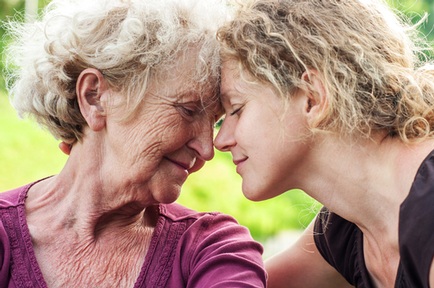Care home residents in England allowed unlimited visitors
Covid restrictions in England’s care homes will be eased from Monday 31 January - with no limit on the number of visitors allowed and a reduction in self-isolation time among the new rules, following the country's successful booster rollout.

Some 86 per cent of all care home residents have had their booster jab to date (27 January).
The Department of Health and Social Care (DHSC) has announced that from 31 January, it is cutting the number of days a care home must follow Covid outbreak rules from 28 to 14 days, as part of the removal of Plan B restrictions in England.
Health Secretary Sajid Javid said: "Thanks to the progress we have made, I am delighted that care home restrictions can now be eased further allowing residents to see more of their loved ones.”
In its announcement today, the DHSC stated the 'changes will ensure those providing and receiving care are kept safe while increasing freedoms for residents'.
Residents will no longer have to be tested or self-isolate after a normal visit out.
Care home residents self-isolating after an emergency hospital visit will be reduced from 14 days to 10 days at most.
Self-isolation periods will be cut from 14 to 10 days for those who are Covid-positive, with more reductions if they test negative on days five and six but many believe the government has not done enough to make residents' lives easier.
Care leader says visitor changes do not go far enough
Former care home manager Adam Purnell, who is now a director of social care at Institute of Health and Social Care Management, believes more changes in relation to care home visits are needed.
Adam Purnell said that unlimited visitors "sounds great" but "if draconian booking systems remain, it won't make a difference. Time for more open visiting."
In a tweet (@AdamDPurnell), Mr Purnell stated: "Visiting must start to include unlimited bedroom visits, a move towards communal visiting, no time restrictions and parity in evening and weekends."
He also believes "isolation must match that of society, not 10 days".
By 16 February, care workers in England will be asked to take lateral flow tests before their shifts instead of having weekly asymptomatic PCR tests.
Age UK: Some care homes 'a lot keener than others on visiting'
Caroline Abrahams, the charity director at Age UK, says some care homes are "keener than others" on normal visiting and also warns "rolling outbreaks" could continue.
She said: "It's really good news that the restrictions on care home visiting are being eased, but there's also a risk that the government rhetoric is ahead of the reality that many older people and their loved ones will actually experience over the next few days and weeks.
"There are still significant numbers of COVID-19 outbreaks in care homes and although the closure period in these situations is being reduced, it is likely that some homes will continue to experience 'rolling outbreaks', keeping them closed."
She also warned that even though the guidance has been eased, some care providers may lack the staff to provide the supervision for normal visiting to resume.
"Some care home operators are a lot keener than others on visiting. There's no reason to suppose that this will suddenly be changed by this new guidance and, in the end, these decisions are the responsibility of care home owners and managers, as the government has repeatedly pointed out."
The DHSC said data from the UK Health Security Agency shows the booster is 92 per cent effective in preventing hospitalisation two weeks after it is administered.
Care minister Gillian Keegan said: “The changes announced today are backed by scientists, ensuring we all have more freedoms from coronavirus, including care home residents and their families.”
Diane Mayhew, co-founder of the Rights for Residents campaign group said that when vaccines came out "that didn’t translate to care and visits and it’s been wrong. We are waiting to see more devil in the detail".
She will continue to campaign for Gloria’s Law to enshrine the right of every resident to nominate an essential care giver in law ”because restrictions can change at any minute”.
“We need to make sure that we are legally able to provide that support that residents so need for their mental health and wellbeing.”
Latest News
 29-Jul-24
Dementia Bus gives carehome.co.uk staff insight into life with dementia
29-Jul-24
Dementia Bus gives carehome.co.uk staff insight into life with dementia
 01-Mar-24
Find out the top care homes in 2024
01-Mar-24
Find out the top care homes in 2024
 21-Mar-23
UK's top care homes in 2023 revealed
21-Mar-23
UK's top care homes in 2023 revealed
 03-Jan-23
carehome.co.uk launches free care helpline
03-Jan-23
carehome.co.uk launches free care helpline
 13-Dec-22
5 mins with Emily Whitehurst, chief operating officer for Constantia Healthcare
13-Dec-22
5 mins with Emily Whitehurst, chief operating officer for Constantia Healthcare